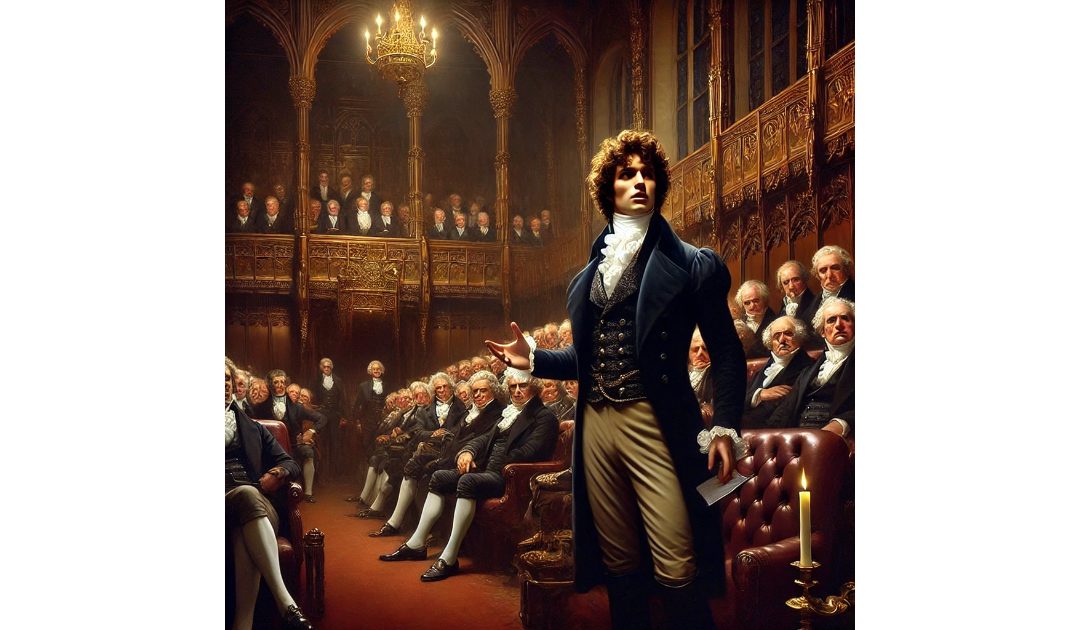On the 7th of February 1812, Lord Byron (George Gordon Byron) made his maiden speech in the House of Lords. He spoke in defence of the Luddites.
The trial of the Luddites took place during the height of the Luddite movement, a workers’ rebellion against mechanisation in the textile industry. The Luddites, primarily skilled weavers and artisans, feared that new machinery, such as power looms and stocking frames, would replace their jobs and undermine traditional craftsmanship. In response, they engaged in machine-breaking and violent protests, particularly in Nottinghamshire, Yorkshire, and Lancashire.
The government, alarmed by the growing unrest, passed the Frame Breaking Act in 1812, making industrial sabotage punishable by death. That same year, several large-scale Luddite trials were held in York and Lancaster. The most significant trial occurred in York in January 1813, where over 60 men were charged with crimes ranging from rioting to murder. The proceedings were heavily biased, as the government sought to make an example of the Luddites.
Ultimately, 17 men were sentenced to death, and several others were transported to Australia. Among those executed was George Mellor, a key Luddite leader accused of murdering a mill owner. The harsh sentences were intended to suppress further rebellion, and combined with increased military presence, they effectively ended the movement by 1817.
Lord Byron (1788 – 1824) was one of the most influential poets of the Romantic era, known for his flamboyant lifestyle, rebellious spirit, and deeply passionate poetry. Born George Gordon Byron in London, he inherited the title of Baron Byron at the age of 10. He was educated at Harrow and later at Trinity College, Cambridge, where he gained a reputation for his wit, charm, and scandalous behavior.
Byron first achieved literary fame with Childe Harold’s Pilgrimage (1812), a semi-autobiographical poem that captured the restless spirit of a disillusioned young man. His later works, such as The Giaour, The Corsair, and Don Juan, further established his reputation as a master of poetic storytelling. His writing often featured the archetype of the “Byronic hero” a brooding, passionate, and flawed protagonist, reflecting Byron’s own personality.
Byron’s personal life was as dramatic as his poetry. He was notorious for his affairs, including relationships with married women, his half-sister Augusta Leigh (rumored to be incestuous), and numerous lovers across Europe. His scandalous reputation led him to leave England permanently in 1816. He traveled to Switzerland, where he befriended Percy Bysshe Shelley and Mary Shelley, and later settled in Italy.
A strong advocate for freedom, Byron became actively involved in the Greek War of Independence against the Ottoman Empire. He spent his fortune supporting the cause and even took command of a rebel army. However, he fell ill and died of fever in Missolonghi, Greece, in 1824 at the age of 36.
You may disagree, but I think the term Luddite is most often used in a negative sense for someone against progress and innovation. The Luddites were trying to protect their jobs and their families, as Byron very passionately argued. We face a similar situation today with AI. What will we do with people when robots do all the jobs? It could be a Utopia in which we can all pursue our own interests. But how would we value people? Is there a scenario in which the tech-giants don’t own everything?

